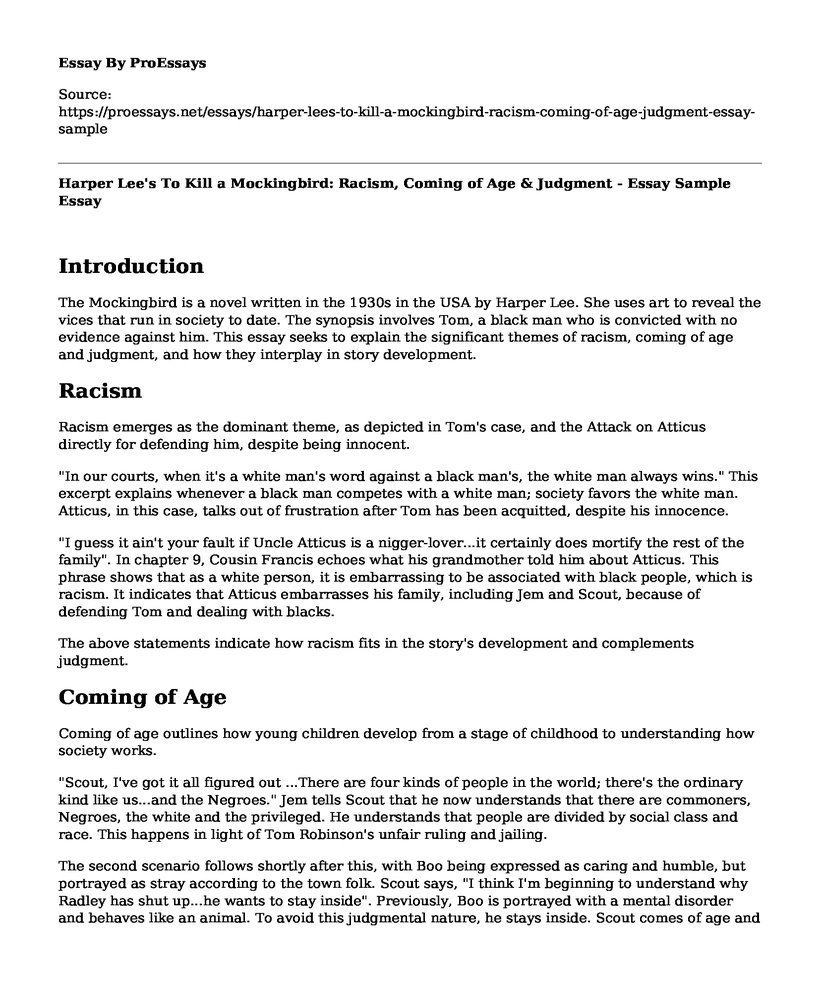Introduction
The Mockingbird is a novel written in the 1930s in the USA by Harper Lee. She uses art to reveal the vices that run in society to date. The synopsis involves Tom, a black man who is convicted with no evidence against him. This essay seeks to explain the significant themes of racism, coming of age and judgment, and how they interplay in story development.
Racism
Racism emerges as the dominant theme, as depicted in Tom's case, and the Attack on Atticus directly for defending him, despite being innocent.
"In our courts, when it's a white man's word against a black man's, the white man always wins." This excerpt explains whenever a black man competes with a white man; society favors the white man. Atticus, in this case, talks out of frustration after Tom has been acquitted, despite his innocence.
"I guess it ain't your fault if Uncle Atticus is a nigger-lover...it certainly does mortify the rest of the family". In chapter 9, Cousin Francis echoes what his grandmother told him about Atticus. This phrase shows that as a white person, it is embarrassing to be associated with black people, which is racism. It indicates that Atticus embarrasses his family, including Jem and Scout, because of defending Tom and dealing with blacks.
The above statements indicate how racism fits in the story's development and complements judgment.
Coming of Age
Coming of age outlines how young children develop from a stage of childhood to understanding how society works.
"Scout, I've got it all figured out ...There are four kinds of people in the world; there's the ordinary kind like us...and the Negroes." Jem tells Scout that he now understands that there are commoners, Negroes, the white and the privileged. He understands that people are divided by social class and race. This happens in light of Tom Robinson's unfair ruling and jailing.
The second scenario follows shortly after this, with Boo being expressed as caring and humble, but portrayed as stray according to the town folk. Scout says, "I think I'm beginning to understand why Radley has shut up...he wants to stay inside". Previously, Boo is portrayed with a mental disorder and behaves like an animal. To avoid this judgmental nature, he stays inside. Scout comes of age and displays maturity when he understands why things happen the way they do with Boo.
The above scenarios indicate the importance of time, as Scout and Jem finally understand how society is biased.
Judgment
Judgment is seen throughout this text, manifested when the town folks make a conclusion without more in-depth investigation in Boo's case, and
"The assumption... all niggas cannot be trusted around our women." This statement indicates that all black males cannot be trusted around women, and can easily rape them. Atticus presents his resentments in court as he expresses the judgmental nature of whites based on Robison's case.
"Judging from his tracks, he dined on raw squirrels." This indicates that Boo is an animal, and doesn't care at all. This is the talk that the town has on Boo. They judge him based on his mental disorder, without getting to know him personally. These two scenarios indicate how the judgment in both whites and blacks happens equally and is based on people's ignorance.
Conclusion
In summary, the above essay outline how racism, judgment, and coming of age are intertwined in the court case of Tom. It also indicates how one theme line supports the other and the reflection on the modern-day society.
Cite this page
Harper Lee's To Kill a Mockingbird: Racism, Coming of Age & Judgment - Essay Sample. (2023, Jul 06). Retrieved from https://proessays.net/essays/harper-lees-to-kill-a-mockingbird-racism-coming-of-age-judgment-essay-sample
If you are the original author of this essay and no longer wish to have it published on the ProEssays website, please click below to request its removal:
- Gang Violence in Washington DC Research
- The Production, Sale, and Consumption of Alcohol Should Be Prohibited - Essay Sample
- Critical Essay on Imagery in the Death of a Salesman
- Essay Example on Poetry: Expression of Hidden Meanings Beyond Love
- Migrant Detention: A Global Crisis for Refugee and Immigrant Children - Essay Sample
- Unemployment & Poverty: Sub-Sahara's Woes & Economic Fluctuations - Essay Sample
- Elizabeth Barrett Browning: Poet of Love and Life - Essay Sample







